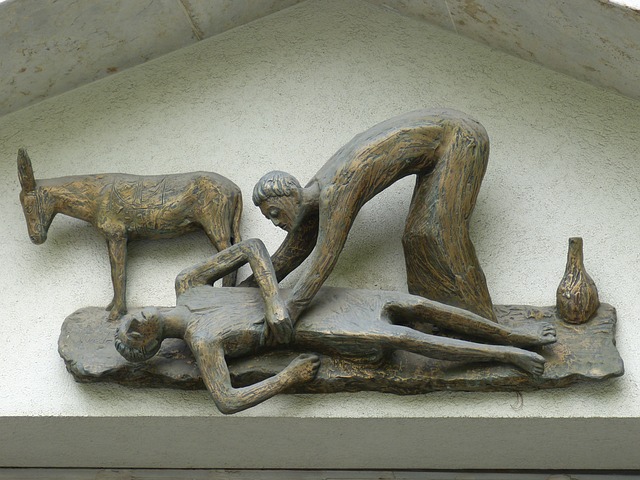
By this all people will know that you are my disciples, if you have love for one another. –John 13:35
Will people know we are Christians (disciples or followers of Jesus) by our verbalized theological beliefs? Will they know we are Christians by the way we vote? Will they know we are Christians by the church we are members of or attend? Will they know because we “witness” or share our faith? Will they know because we don’t drink, dance, smoke or attend R rated movies? Will they know because we only listen to Christian music and watch “clean” movies and television? Will they know because we are just generally all-around swell and nice people? Will they know because we tell them so?
Nope. They may gather all sorts of other information about us from those markers, but it wouldn’t tell them whether or not we were Christians. Jesus set out the marker for how “all” people would know whether or not someone was a Christian. Here it is: Do they love others?
And let us not quibble over the “one another” designation in the scripture reference above. It would be like the person who asked Jesus, “And who is my neighbor?” The John 13:35 passage refers, given the context, to primarily other Christians; however, that doesn’t preclude loving non-Christians by way of what Jesus has also said about loving our neighbor and even our enemies. Thus, we should understand it to mean, ultimately, all people.
And love is shown. It is demonstrated. It is not something one just verbalizes. It is lived. It can be verbalized and often should be, but it is hollow and ultimately meaningless if not reflected in our actions and lived lives.
When thinking about this marker that Jesus laid down, I have often reflected upon the fact it means that some of the best Christians (by this marker/standard) I have known—were atheists.
Perhaps they were only atheists in practice. Maybe they never gave it much thought, but they lived like an atheist in the sense of never attending a church, being a member, and never really talking about God or religion. In a way, they were practical atheists. Whatever they may have thought about it, it seemed like they lived as if God didn’t exist.
Others were admitted atheists. They had given it some thought. And they had come to the conclusion either God did not exist or that it was simply something we couldn’t know. Many were more agnostic than atheist, which in my mind is the wiser course.
Either way, when I think of the examples I knew, or know even now, of both types, they were much better “Christians” than the many I knew who professed their Christianity but lived something else. And what I mean by living something else is that they were extremely poor lovers of others.
I’ve known too many Christians over the years who were perpetually angry (at one thing or another). They were mean. They were self-righteous. They were judgmental. They lacked mercy and kindness. They lacked imagination and humor. They looked down upon the poor rabble who didn’t know or acknowledge their God or their understanding of that God.
They viewed life and the “other” with suspicion and fear—almost as if they couldn’t wait to get off this “filthy” world with all its “evil.” For them, the “last days” were always upon us and since they had their “fire insurance” salvation, they were ready to leave and let the world burn. What sort of “love” is that, whether for people or creation in general? Obviously, I knew Christians who were not like this but I also knew too many who were.
We are also told that love covers a multitude of sins (1Peter 4:8). Perhaps love is the way then to not only identifying as Christian but as the means to our very salvation. I have nothing against formal religion, per se. As to Christianity, I think baptism, the sacraments, discipleship, and worshiping in community are important elements/aspects to a Christian’s life. I participate in that life.
However, I don’t think such is what fundamentally marks one as a Christian or follower of Jesus. Only love can do that. Only a demonstrated and consistent loving of the other, over time, can do that. The philosopher Soren Kierkegaard wrote this:
“Life can only be understood backwards; but it must be lived forwards.”
And I am beginning to think that we can only know whether or not we were Christians- backwards. We have to live it forward, but whether or not we were Christians, followers of Jesus, remains to be seen. Since the marker is whether we loved others, then the jury is still out until we are no longer a part of this life and there is no one left to love among the living.
And maybe we will learn, finally, at the end of our time whether we were a Christian or not. We won’t learn it through introspection or how we felt about it, at any given moment. We will learn it was true if the other people in our lives felt we loved them, even the people we maybe didn’t care for. In a way, we sit in the dock, so to speak, waiting to find out if the people in our lives knew we loved them. Perhaps that is the final judgment.
And if any person has spent their life loving others, as best they could, then I tend to think they are Christian or act like a follower of Jesus—regardless their belief or unbelief. I assert this from a Christian perspective, not to presume any superiority over other faiths or lack thereof.
I completely understand the person I’m describing (who is not a Christian or is an atheist/agnostic) would see their loving others as coming from a completely different place. I get that. I don’t care where it comes from. My point is that, from my perspective as a Christian, this is the marker Jesus laid down, as to how people would know who his followers were.
Thus, some of the best Christians I have ever known were atheists or had nothing, in general, to do with the Christian religion.
Check out my new book.
I have a Patreon Page—please consider supporting my writing.













